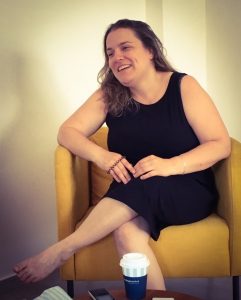“Fiction as Counter Memory: Writing Armenia and Palestine in Aline Ohanesian’s Orhan’s Inheritance (2015) and Susan Abulhawa’s Mornings in Jenin (2010)” (with Kate Mitchell). College Literature: A Journal of Critical Literary Studies, forthcoming.
“Entangled Suffering and Empathy: The Holocaust, the Nakba, and the Israeli-Palestinian Conflict in Susan Abulhawa’s Mornings in Jenin.” Memory Studies, pre-published 6 January 2020, pp. 1-18. DOI:10.1177/1750698019896850
“Literatur als kultureller Widerstand: Palästinabilder aus der Diaspora.“ WestEnd: Neue Zeitschrift für Sozialforschung 16, No. 1: Helfen zwischen Solidarität und Wohltätigkeit. (2019): 33-53.
“Die Jerusalem-Frage – Ein unlösbarer Konflikt? Von der Macht widerstreitender Narrative” (with Christian Wiese). Forschung Frankfurt 1.2019 (2019): 17-20.
“Literatur als kultureller Widerstand. Palästinabilder aus der Diaspora.“ WestEnd: Neue Zeitschrift für Sozialforschung 16, no. 1 (2019): 33-53.
“Facing the Arab ‘Other’?: Jerusalem in Jewish Women’s Comics.” Studies in Comics 6.2 (2015): 291-311. (Special Issue: Comics by Jewish Women).
“Landscapes of Scripture and Conflict: Cultural Memories and the Israeli West Bank Barrier.” Landscapes 15.2 (2014): 143-155. (Special Issue: Landscape and Conflict).
“Writing a Whole Life: Maria Lewitt’s Holocaust/Migration Narratives in ‘Multicultural’ Australia.” Life Writing 11.4 (2014): 391-410. (Special Issue: Displaced Women: Eastern European Post-War Narratives in Australia).
“Graphic Novels Explore an (Un-)Holy Land.” Quest: Issues in Contemporary Jewish History 6 (2013): 73-107. (Special Issue: Travels to the “Holy Land”: Perceptions, Representations, and Narratives).
“Searching for a Lost Place: European Returns in Jewish Australian Second Generation Memoirs.” Crossings: A Journal of Migration and Culture 4.1 (2013): 31-50.
“Introduction: Entangled Pasts.” Crossings: A Journal of Migration and Culture 4.1 (2013): 3-11. (mit Jacqueline Lo und Kate Mitchell).
“Re-inscribing Holocaust Memory: Ruth Klüger’s still alive as American Jewish Autobiography.” Holocaust Studies: A Journal of History and Culture 18.3 (2012): 37-75.
“‘And I did want to pass’: Reading Canadian Second Generation Holocaust Memoirs as Migration Texts.” Zeitschrift für Anglistik und Amerikanistik: A Quarterly for Language, Literature and Culture 59.2 (2011): 109-122 (Special Issue: Crossroads: Canadian Cultural Intersections).
“Investigating (in) multicultural Jerusalem: Jonathan Kellerman‘s The Butcher‘s Theatre.” Religion and the Arts 5.1-2 (2011): 111-129 (Special Issue: Jerusalem).

